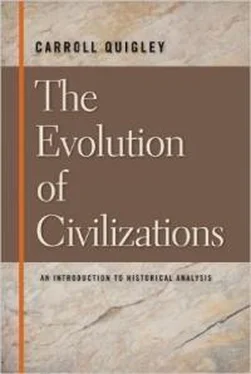2. Gestation
The period of mixture of Western civilization was merely a continuation of the period of invasion of Classical civilization and lasted from about A.D. 370 to at least 750. It was followed by a period of gestation of about two hundred years. The two periods together had to achieve three tremendous tasks: first, to bring into existence the new Christian society by creating relationships between groups and individuals and by establishing patterns of ideas and activity that would permit a new society to survive; second, to repel invasions of non-Christian cultures or to enforce conformity to the new Christian patterns by those who could not be expelled; and, third, the accumulation and investment functions of the instrument of expansion must begin to operate. These three tasks were achieved in the order in which we have listed them, the first in the period of mixture, the third in the period of gestation, and the second bridging over both periods. This second was such a gigantic task that it delayed the achievement of the third task and led the society into political ambitions that could not possibly be supported by the economic base available. These ambitions took the form of the Carolingian Empire, whose brief life covered the generation before 814.
The task of repelling invaders from Christian society was extraordinarily successful. To us today it is still a puzzle as to how it was achieved. As late as 732 the Saracen invaders were only fifty miles from Paris, but as early as 1099 the Christian counterattack on the Saracens had captured Jerusalem. During most of this interval the attacks on the West continued, by Vikings and Northmen in the Baltic and North Sea areas, by pagan Germans and Turkic peoples from the East, and by the Saracens in the Mediterranean area. In one way or another, these peoples were pushed back or were adopted into Western society.
The success of these military achievements, especially by the Carolingians, led to their abortive effort to reestablish in Europe a recreated universal Roman Empire. This was an overextension of military and political ambitions quite unwarranted by the social and economic conditions. In terms of our analysis it meant that surpluses being accumulated by the political and military organizations were being expended in the same levels in an effort to expand on these levels more rapidly than the economic basis would allow. Before any centralized political system such as Charlemagne's could function steadily, it was necessary to achieve a very great expansion and intensification of the economic level by diverting the surpluses being accumulated on the political and military levels into the economic level.
The real difficulties on the political and military levels that made the Carolingian effort fail were in respect to three phenomena: (1) poor transportation, (2) poor communications, and (3) the superiority of defensive weapons. We have already mentioned that the old Roman Empire was supported on the shores of the Mediterranean Sea by the superiority of sea transportation over land transportation, thus binding the shores of the sea to each other more closely than any shore was bound to its own hinterland. The recreation of a universal Carolingian Empire would have needed a system of land transportation able to bind Europe into a unified whole. No such system existed or could exist in the year 800. Roads were almost totally lacking, and could not be supported in any adequate fashion by the limited output of the economic system. At that time Europe was just obtaining from the East an adequate method of harnessing, including the horse collar and traces, but this method was not yet widely known, and the economic system was not able to support any large number of horses or men devoted to transportation.
Closely related to the lack of transportation was the inadequacy of communications, including that basic item, the level of literacy. Literacy has been associated historically with the existence either of a priestly group seeking to keep records or of a commercial group seeking to communicate over a distance as well as to keep records. The transportation inadequacy that led to self-sufficient manors and the political disorder that gave a low level of personal security combined to make commerce almost impossible in the early medieval period. Without a commercial group, literacy thus was a monopoly of the clergy, but even here poverty and disorder led to a high degree of localism and a decrease in communication and in literacy. Without these things no centralized government could possibly function, and the Carolingian effort to establish one proved abortive. It is worthy of note that the subsequent revival of government, after the tenth century, followed very closely the revival of literacy among the clergy and a new commercial class and that rulers made use of these two groups in sequence to count their moneys and handle their communications and accounts.
The third factor in the disappearance of centralized government was the superiority of defensive weapons. For any government to function, it must be able to know what is happening at a distance, to communicate its orders, and to enforce obedience to these. The enforcement of obedience to orders cannot go further than the limit of the superiority of offensive power over defensive power. In the year A.D. 900 there was no such superiority. On the contrary, the defense was superior over the offensive to a degree that has never been exceeded in the historic period, even during its nearest analogy—the Mediterranean world about 1000 B.C.
The military system of Europe about A.D. 1000 is of extraordinary interest because it was built about two "supreme weapons," neither of which could defeat the other. These were the mounted knight and the castle. Quite obviously, a castle could not defeat a knight. And, almost equally obviously, a knight could not defeat a castle. The only way that a knight or group of knights could defeat a castle was by siege, but this was extremely difficult during the early Middle Ages because of the technical difficulty of supplying a besieging force at a distance so that it could starve out the defenders before it starved itself from exhaustion of supplies. Any besieging force had to be stronger than the besieged or it would be driven from the area and the siege broken. But to maintain a superior besieging force placed an almost impossible burden on the available transport. The besiegers could starve out the besieged only if they could supply a larger force at a distance than the besieged had available in their own stores. This was such an unlikely possibility for much of the Middle Ages that a castle remained as a supreme defensive weapon for most of that period. Politically this means that anyone who had a castle could say "no" to any order and could not be forced to submit. This means that every such castle became a nucleus of political independence and, since there were thousands of such castles in Europe about 1000, it meant that Europe was divided into thousands of independent political units and that centralized political power over any extended area was impossible. In this situation the clash of knight against knight was much less significant, for a knight, even when defeated on the field, could not be made to obey if he could retire into his castle.
The defensive superiority of the castle inhibited the growth of larger political units longer than the inadequacy of transportation might warrant because of the intrusion of other factors. One of these delaying factors is to be found in the organization of feudalism itself. Feudal relationships sought to organize over larger areas by subinfeudation. By this process a lord would be owed military service and advice (auxilium et concilium) from a large number of vassals, each supported by an economic unit (fief) organized in manors. Efforts to organize these relationships into larger and larger systems led to problems that students of organization call "problems of span." If, for example, the king of France had the right to expect 5,000 knights to answer his summons to military service, he would face an insoluble problem of span if he had to send out 5,000 individual summonses because he had 5,000 separate individual vassals. To avoid this the lord reduced the number of his direct vassals to a manageable span by requiring numerous knights' services from each vassal. Thus the king of France could still summon 5,000 fighting men to service if he had 50 vassals each of whom owed 100 fighting men's services or if he divided up the 5,000 into any two factors whose product would provide 5,000 men. The vassals who owed plural service could obtain the necessary fighting men by subinfeudating the fiefs that supported these fighters to their own vassals, or through them to their vassals' vassals. As these relationships became established, each vassal sought to specify what he owed his lord, and thus there gradually arose customary limits on the military service a lord could demand from his vassals. In many areas these limits came to be understood as no more than forty days' military service each year and at no greater distance than two or three days' ride (forty to fifty miles) from the vassal's residence. These limits made it impossible to besiege a castle successfully within the limits, and this served to extend the defensive invulnerability of a castle against feudal forces even after the period when the inadequacy of transportation had hampered sieges.
Читать дальше










